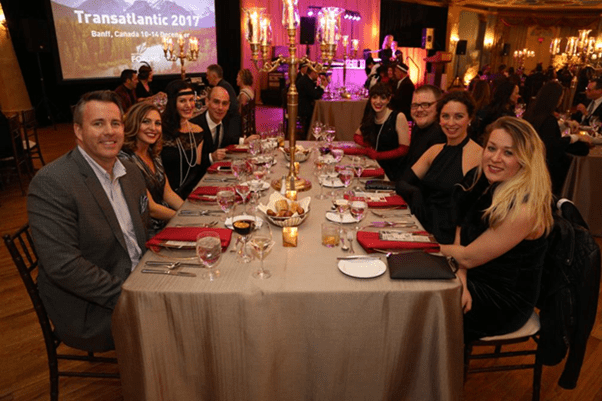Behind the scenes event planning involves coordinating many details to ensure a smooth experience for attendees. It includes things like choosing a venue, managing vendors, and handling logistics. This behind-the-scenes work is essential for any successful event because it lays the foundation for everything that happens in front of the attendees.
Understanding how events are created is crucial for putting together memorable experiences. This includes having clear goals, knowing who your target audience is, and coming up with a unique theme that sets your event apart. Every little thing, from the sound and video equipment to the materials people use to sign up, plays a big part in creating an experience your guests won’t forget.
In this article, you’ll not only learn about event planning insights but also some major event planning secrets for a successful execution:
Using these insights can change how you plan events and help you consistently deliver great experiences.

M&I, a leading event planning company, has gained widespread recognition for its trailblazing approach to trade shows. With a track record spanning over 20 years, M&I has been at the forefront of transforming the MICE industry by veering away from conventional formats and creating dynamic environments that foster business networking and collaboration.
Traditional trade shows often come with limitations that can hinder creativity and meaningful connections. However, M&I has successfully broken free from these constraints through its design of events that are not only innovative but also highly impactful. Their approach includes:
Several key elements set M&I’s events apart:
M&I’s programming is meticulously crafted to foster meaningful connections among attendees. This includes:
M&I’s success in reimagining trade shows lies in their unwavering commitment to innovation and excellence. Their approach ensures that each event is not just a gathering but a memorable experience that drives real business outcomes.

Selecting reliable vendors is another critical step. From catering to AV services, each vendor plays a role in creating a seamless experience.
Make sure you research and vet vendors thoroughly and check references and reviews to ensure they can meet expectations.
A comprehensive checklist is crucial to avoid overlooking any details during the hectic pre-event phase. The event planning process demands meticulous attention and effective communication at every stage.
Essential items for your event preparation checklist
Attention to detail, thorough preparation, and effective time management are key steps in ensuring a seamless execution, paving the way for a memorable event experience.

Understanding how events are created is crucial for putting together memorable experiences. This includes having clear goals, knowing who your target audience is, and coming up with a unique theme that sets your event apart.”
Event logistics management is a complex process that ensures every part of your event runs smoothly. The logistics behind an event shape the overall attendee experience, making seamless execution extremely important for success.
Logistics determine how attendees perceive and engage with your event. From the moment they arrive until they leave, every interaction needs careful planning. When logistics are handled perfectly, attendees can focus on what really matters—connecting with others, gaining knowledge, and enjoying the event.
Logistics management isn’t just about moving people from one place to another; it’s about creating a smooth journey that aligns with the event’s goals.
By understanding each logistical aspect—from transportation and accommodation to on-site flow—you lay the groundwork for an event that not only meets expectations but exceeds them.

Successful event execution depends on turning careful planning into flawless on-site delivery. This is crucial for creating memorable experiences that stay with attendees long after the event ends.
Gaining insights from successful event case studies helps us understand what works well in practice.
M&I has redefined traditional trade shows through innovative formats and cutting-edge technology. Their event in The Hague showed us how they did it:
Another impressive example of event success stories is M&I’s Discover Georgia forum:
These success stories represent key principles behind the scenes of successful events:
In summary, turning planning efforts into smooth on-site execution is a complex process that requires collaboration, problem-solving skills, and attention to detail. Learning from real-life examples offers valuable lessons that can take your next event to new heights.

Valuable event planning insights from experienced event planners can be incredibly helpful when dealing with the inevitable obstacles that arise during the event organisation process. These are some of the key strategies that seasoned professionals often highlight:
Flexibility is crucial. An adaptable mindset allows you to pivot quickly when faced with unforeseen challenges. For instance, if a key speaker cancels last minute, having a backup plan ensures the event continues smoothly.
Navigating logistical complexities is another area where event preparation tips are essential. Here are some practical approaches:
Engaging attendees can also be challenging. Implementing interactive elements such as live polls or Q&A sessions keeps participants engaged and enhances their experience.
Adaptability is not just beneficial; it’s necessary. Events often face unpredictable changes, whether due to weather conditions or unexpected guest requests. Maintaining flexibility allows you to handle these changes without disrupting the overall flow of the event.
For example, if you’re organising an outdoor event and weather forecasts predict rain, having an indoor alternative ready can save the day. Similarly, being prepared with extra audio-visual equipment ensures that technical failures do not stall the proceedings.
By incorporating these expert insights and maintaining an adaptable approach, you can navigate the complexities of event planning successfully.
Behind-the-scenes work is the backbone of successful event making. It’s more than just logistics; it’s about creating an environment where meaningful connections and lasting impressions thrive. When planning an event, every detail, from venue selection to vendor coordination, plays a pivotal role in shaping the attendee experience.
Understanding the intricate process behind event planning can transform your approach. Think about how you can apply these insights to elevate your own events:
By focusing on these event planning secrets, you can craft memorable experiences that resonate with your audience long after the event has ended.
Embrace the behind-the-scenes magic to create events that not only meet but exceed expectations. Thus, event planning insights are crucial for organising successful and memorable events.
Change the trajectory of your business in 2025 by coming to an M&I event and building strong, meaningful business relationships. See our full calendar of events below and get in touch.


© M&I is part of Worldwide Events Group Ltd, which includes PLE, 1st Floor, 5-7 Marshalsea Rd, London, SE1 1EP
Affiliate company: White Label Travel
14-16 April 2026 | Abu Dhabi
American buyers
24 - 28 Feb | Austria
Foster new cross-continental business relationships
UK & EU buyers
30 Nov - 4 Dec 2025 | UAE
Discover the Pearl of the Middle East while building lasting MICE connections
Open your property up to a new range of events and opportunities by taking advantage of an online assessment created by our event partner, Healthcare Venues, which will determine if your venue is capable of hosting healthcare meetings and events.
If your property passes, you’ll receive Healthcare Venue certification, verifying you to our buyer network as a specialist healthcare venue.
Tim Chudley
Managing Director, Sundial Group